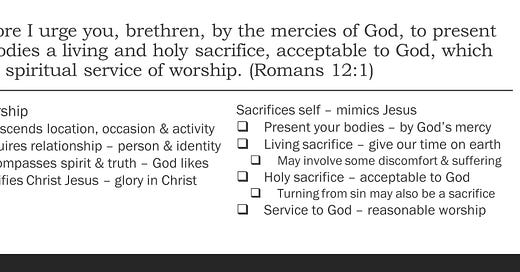As we study “true worship” in the New Testament, we find several surprises. First, we find an unexpected deemphasis of worship in the New Testament. Jesus accepts worship when offered freely, but never demands it nor even suggests it.
Second, it has nothing to do with form, pattern or location. Jesus rejects these things. He emphasizes a real knowledge of God and acceptance of His plans & priorities. Those who hold to man’s teachings present empty worship to God (Mark 7:7). The Father seeks for those who worship Him as He desires rather than pursuing their own desires.
Third, worship of God begins and ends in spirit and truth. Those who emphasize the flesh (heritage and religious activities) completely miss true worship because they fail to perceive God’s priorities as spirit. God rejects those who come to Him with masks. He sees through alternative motives.
Yet, most Christians focus on expressions of worship (physical, emotional, verbal or musical) rather than the spiritual issues. Having ignored biblical teaching, they feel qualified to define proper worship based on personal preferences, experience and traditions.
Too many Christians ignore another key aspect of true worship:
Therefore I urge you, brethren, by the mercies of God, to present your bodies a living and holy sacrifice, acceptable to God, which is your spiritual service of worship. (Romans 12:1, NASB)
Self-sacrifice sounds extreme. And yes, Paul asks for something beyond the usual devotion to a sports team, company or school. But no, Paul isn’t talking about suicide, martyrdom or self-immolation.
He begins by referencing the mercies of God. God shows His people many mercies. He gave us life and continues to sustain us. He cares for us, protects us, and provides for us. He forgives our sins and works to transform us into the likeness of His Son. We owe Him a lot.
With the mercies of God in mind, Paul asks that we surrender our bodies to God. Paul is thinking of a “living sacrifice,” not a dead one. That means we don’t kill ourselves, but we present God with all the years remaining to us. How does this work? We offer ourselves in service to God.
By using the metaphor of sacrifice, Paul means that we accept whatever task(s) God assigns. Most people will volunteer for the prestigious and administrative positions in God’s kingdom as long as they pay enough to enjoy a middle-class lifestyle. We can’t apply the word sacrifice to these jobs. Sacrificial offerings may require some discomfort and suffering on our part.
Paul describes this offering of our bodies as a holy sacrifice. This seems like a strange qualification in light of the Scriptures. Based on our knowledge of the New Testament, one could hardly call our bodies holy. Without going into a huge study about this, I think Paul expects us to clean up our act as part of our offering to God. Turning away from sin may be a type of sacrifice for many. Even this step demonstrates adoration for God louder than a thousand-voice choir.
Paul asks us to sacrifice our lifegoals for the one who gave His life for us. He desires that we become willing to obey God without reservation as He accepts our service. He also expects that we abandon sin as we enter the service of the holy God. Does all this sound extreme? Does it sound like a reasonable response to the mercies of God?
One Bible translation renders the word “spiritual” as a “reasonable” (or “logical”) response of godly worship. Why reasonable?
In the Mosaic system, sacrifice proves one’s loyalty to God. The Jews show respect for His justice and sovereignty by giving something of value to Him. Yet, the sacrifice remains external to the worshiper. Judaism operates as a voluntary exchange, an animal for forgiveness of sins.
Christianity begins on that foundation and then moves forward. Christ loved us and gave Himself for us. God becomes the sacrifice. Christianity works on the basis of love, not economics. It only seems reasonable that we love God and give ourselves to His service. We don’t come to Him out of fear of His vengeance, wrath, or justice. We sacrifice ourselves as a reasonable response to the sacrifice of Christ on the cross:
For this reason the Father loves Me, because I lay down My life so that I may take it again. No one has taken it away from Me, but I lay it down on My own initiative. I have authority to lay it down, and I have authority to take it up again. This commandment I received from My Father. (John 10:17–18, NASB)
Sacrifice of self indicates a worship of God beyond measure which only matches the boundless sacrifice of Jesus on the cross. This has always been God’s goal with His people. He loves us so much and constantly works to build a reciprocal feeling in us.
When you come to God in a self-sacrificial worship, you don’t argue about the styles of the music, the content of the preacher’s sermon, or the length of the prayers.




